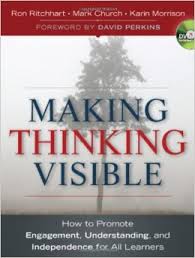
In January I went to a workshop with my school advisor, a workshop presented by Ron Ritchhart who is a researcher with Harvard’s Project Zero. It was excellent and I can’t wait for part II. Before the workshop and over the winter break I read his book “Making Thinking Visible”. I found it very interesting, I especially liked some of the “thinking routines” so I was really looking forward to hearing him speak.
Something that really influenced me from this book were the reflections of the second author Mark Church- he mentioned that early in his career he overemphasized “fun” and planned activities that were “hands on”, but not minds on. The example he gave was playing a game of jeopardy with his class to prepare for a test. This is a “palatable form of practice” but it doesn’t challenge students to think about the material in a meaningful way.
I think the work being done by the researchers at Project Zero is extremely influential for the field because it gives purpose to the idea of inquiry and project based learning. If we truly commit ourselves to wondering and asking questions then it is only inevitable we find out we have more questions than we started with. I view that as a positive thing. That is true learning. Questions reflect the depth of our understanding and asking questions is an authentic place to root learning.
I want to create a culture in my classroom where it’s okay to get the wrong answer, an unexpected answer, or even no answer at all. The most important thing is that you ask the question. I remember saying this when I did the pumpkin investigation in kindergarten. It’s still as real to me as ever going through science fair with my grade five students. I want it to be all about the process.
I want it to be learning and not work.
I agree Mahima! Learning and the joy of it is not work! I do believe, however, that games like Jeopardy have their place as well. Sometimes practice is just practice and can be made fun. That being said, meaningful learning goes so much deeper and when students engage in it, they are excited and engaged.